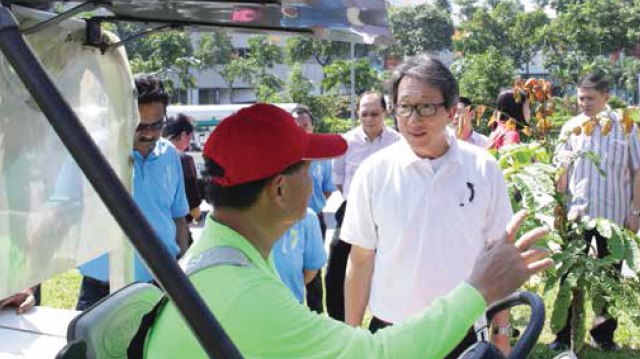Over 26,000 resident cleaners in licensed cleaning businesses are now being paid wages according to the Progressive Wage Model. From 1 September 2014, resident (Singaporean and Permanent Resident) cleaners from licensed companies that are deployed under new cleaning contracts entered into on or after 1 April 2014 will get wages that are according to the Progressive Wage Model (PWM).
This milestone is of much significance and encouragement to the Labour Movement, as they have been championing the cause from day one.
NTUC Secretary-General (SG) Lim Swee Say recollected that this journey to uplift the lives of cleaners started with the Skills Redevelopment Programme (SRP), which evolved into the Job Re-creation Programme (JRP), before setting foot into the Best Sourcing Initiative (BSI), and gradually into the Progressive Wage Model (PWM).
LICENSED COMPANIES
Thus far, over 26,000 resident cleaners in licensed cleaning businesses are being paid wages according to the PWM. By 1 September 2015, licensed companies will have to pay progressive wages to all their resident cleaners, including those under existing cleaning contracts.
Since the licensing regime for cleaning businesses came into effect on 1 April 2014, some 1,001 cleaning businesses, with a total workforce of 52,000 cleaners (including 38,000 resident cleaners), have been licensed by the National Environment Agency (NEA).
SG Lim, NTUC Assistant Secretary-General (ASG) Zainal Sapari, industry partners and several union leaders went on a learning journey on 1 September 2014, where three cleaning companies – Weishen Industrial Services, Veolia Environmental Services and LS 2 Services – showcased their productivity initiatives that have resulted in better jobs, better skills and better wages for their cleaners.
JUST THE BEGINNING
Speaking at a media briefing after the session, SG Lim said that this licensing regime is just the beginning.
“This is a big step forward but only the first step forward. This is like building roads. To get everyone on track, the road must be well constructed. A road has many layers before it can be paved well. SRP, JRP, BSI and the PWM are all our layers. So for us, the road is now finally in place. But the journey has just begun,” he said.
He added that cleaners too, like other workers, aspire for career progression, and that starting from 1 September this year, NTUC hopes that cleaners will not be looked upon as cheap labour but as valuable human resources, and that companies will invest in their career development and upgrading.
“For a long time, in the cleaning industry, the cleaners have been looked upon as cheap labour. Today, with the licensing, we hope this will change,” he added.
ANOTHER NEW EFFORT
In addition to these efforts, the Labour Movement hopes to further professionalise the industry with the development of a new IT system. Keeping in mind that many of the cleaning contractors are SMEs who may not have proper HR systems in place to manage their cleaners, NTUC is now engaging the IT industry to come up with a platform to help them manage their human resources better.
Said SG Lim: “We hope that with this system in place, SMEs will be able to manage the progress of each worker in terms of skills, wages, productivity and job progression better.
“More importantly, this system will enable the SMEs to understand better the profiles of their workers and figure out what they can do to move ahead in the industry.”
ASG Zainal shared that initial discussions with the Infocomm Development Authority of Singapore (IDA) has been positive and more details will be released in later months.
(Source: NTUC This Week)

